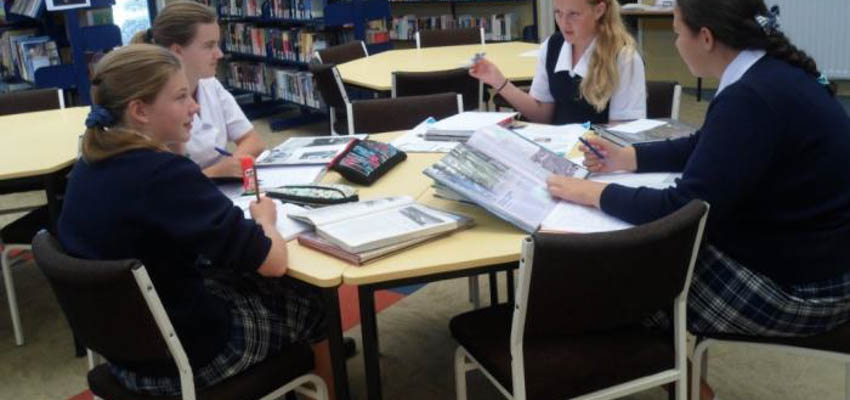
Inquiry into inquiry: The Marlborough Inquiry Project
How could a group of Marlborough schools encourage a more seamless, building blocks approach to inquiry, research processes and skills across all school levels in the area?
Birth of the Marlborough Inquiry Project (MIP)
The blank looks on the faces of Year 9 students when the Librarian at Marlborough Girls’ College talked about research methods, made her wonder whether she was introducing completely new concepts, or whether this was just another example of ‘college shock’.
What had the students learned previously?
Was she building on prior knowledge?
How could she build on the skills the students had already accumulated in their contributing schools?
With Services to Schools' Capability Building support, and agreement from Principals of contributing schools, the Marlborough Inquiry Project (MIP) was born, 2013.
MIP goals
The primary objective of MIP was to collaboratively develop, trial and implement a common research/inquiry process through local schools. This was designed to equip students with a common understanding of the key stages, language used and skills required for successful research, as they transition from primary/intermediate to secondary school, and later to tertiary education.
The overarching project goals were to:
encourage a seamless approach from Years 1-13 to develop and build understanding of inquiry, research skills and processes across contributing schools in the cluster
ensure information/digital skills were embedded into each schools’ curriculum
ensure all students have a good grasp of inquiry methods and associated skills as they move through schooling levels in the region.
Participating schools in the MIP
The schools network in Marlborough consists of a number of urban and rural primary and contributing schools as well as an intermediate, feeding into 2 single sex Year 9-13 colleges, Marlborough Boys' College and Marlborough Girls' College. This project involved Renwick School (primary), Bohally Intermediate and the 2 colleges.
Creating a 5-stage inquiry and research skills framework
A working party of interested teachers and librarians from these schools first compiled a continuum of skills within the inquiry process covering Years1-13, following the Key Competencies in the New Zealand Curriculum.
They then produced a 5-stage inquiry and research skills template for trialling with students and teachers. Each inquiry stage included explicit skills to be taught and developed, based on New Zealand Curriculum levels, with a toolbox of suggested resources appropriate for that stage.
Participating schools were tasked with embedding the process in their own school curriculum. Over time, evaluation would lead to further refinements of the process.
Marlborough inquiry model (pdf, 83KB) — the inquiry and research skills template developed as part of the MIP
Preliminary outcomes of the project
Early outcomes from Marlborough Girls College
An increase in the collaboration between teachers and library staff. Teachers now have a clearer idea of what the library can offer and are beginning to make better use of library services, e.g. curating content, workshops on writing reports, referencing, web evaluation.
Improved understanding by the library team that lessons to teach specific skills need to be reinforced over time. The library now has a Programme where the same or similar skills are reinforced through different subject areas over time, e.g. searching databases for science, or using EPIC in English.
Improved student awareness that information/digital skills can be transferred across different subject areas. Library staff now work with students to explicitly clarify links to different contexts.
That conversations between librarian and teachers lead to proactive marketing of library services and sharing of resources, adding value for the students.
The need to better prepare Year 13 students for post-secondary study. A focus on ‘Tertiary Preparation’ has been introduced by the library, including database searching in more depth, using in-text citation, web evaluation with a focus on currency, and how a university library works.
Progress at Renwick Primary School
Renwick School has embedded the MIP inquiry model at each level in their revised, school-wide literacy curriculum.
In 2015 they intend to follow up further as a part of their third year of ALP (Accelerated Literacy Practice).
They are about to update their school library space and services to reflect 21st century learning pedagogy, linking the library to the school’s curriculum.
For the library to be a learning hub, the school librarian has been intentionally included in their staff exploration of Modern Learning Practice.
The MIP inquiry model has become an integral part of Renwick Schools’ journey towards a 21st century library, while enhancing development of literacy practice within their school.
The project so far has reinforced the following:
New skills need to be reinforced and repeated from year to year using different contexts/subject areas.
Links between subject areas and information/digital skills learned need to be explicitly reinforced.
It's important for all staff to understand the value added input the library can provide to support learning outcomes for students.
Collaboration between library and teaching staff is important in providing better outcomes for students.
Conclusions
While no one size ever fits all, the MIP inquiry model framework and approach provides an invaluable resource for others considering embedding the teaching of information skills and digital literacy, through a similar project.
All rights reserved